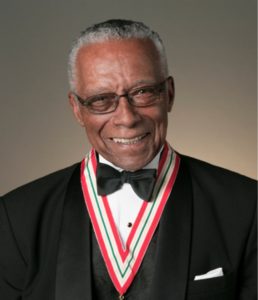
Civil rights leader Dr. Howard Douglas McCurdy died on February 20 at the age of 85.
He was the second Black member of Parliament in Canada – the first for the New Democratic Party – and the first tenured Black professor in Canadian history.
At his funeral in Windsor, Ontario on Saturday, poet George Elliott Clarke delivered the eulogy.
The following is an excerpt from the eulogy:
Because Canada never had the concentrated numbers of black people that the American South hosted, there was never a basis here for a mass movement for civil rights of the sort led by the Rev. Dr. Martin Luther King, Jr., in the 1950s-1960s, in the United States. Yet, there was rampant, anti-black, racial discrimination, if politely or quietly expressed, in schooling, housing, dining establishments, and in employment opportunities. Naturally, these slights grated on Afro-Ontarians, and, worse, threatened to nullify the hopes and dreams of black children, those precious citizens of the province. As a student in the relatively quiescent 1950s, Dr. McCurdy could have concentrated on his demanding studies and told himself that he could leave necessary agitation to others. But he did not take this appreciable course. Rather, he plunged into civil rights agitation. We—the Ontario people—owe Howard a great debt for his youthful—and then life-long—labour to uplift the most severely marginalized among us.
Howard first initiated the formation of a university chapter of the famed National Association for the Advancement of Colored People at Michigan State University (East Lansing). Upon his return to Ontario, where he began teaching at the University of Windsor as a biologist (thus becoming one of the first-generation professors in the still-nascent Black provincial professoriat), Dr. McCurdy formed the Guardian Club, to investigate and document incidents of racial harassment. Thanks to these activities, the Windsor Human Rights Institute was formed in 1964 and then a Committee on Employment Opportunities in 1968. Given Windsor’s location next door to the powder keg of radicalism and racial hostility that was Detroit, Michigan, in those years, it is a testament to Howard’s patience, restraint, wisdom, and goodwill that he brought together black and white citizens to struggle to build a more welcoming city for all. But Howard’s remarkable farsightedness is also evidenced in his decision—in 1964—to inaugurate an exhibit on black history, “From Slavery to Freedom.” The event was so successful that it led to the founding of the North American Black Historical Museum in Amherstburg, Ontario.
Howard’s eloquence, organizational flair, wit, and “mother wit” (common sense) put him in national demand in the later 1960s, as the black population across Canada increased, and it became necessary to improve the ability of immigrants to take their rightful places in Canadian economy, cultural, and socio-political life, but also to build links between the historical black communities and the newer black citizenry. To that end, in 1968, Howard championed the formation of the historic National Black Coalition of Canada, and would later serve as its Chair and then Vice-President. This organization was the nation’s first national black representational body, and many members—Rosemary Brown, Lincoln Alexander, and others—developed ideals of public service, locally and nationally, by becoming involved in its activities, with Howard always present as a guiding intellectual and a constructive coalition proponent.


